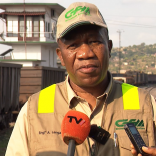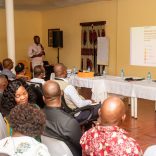Mozambique's Inclusive Political Dialogue: More than $1.4 million for Technical Committee - Carta
Metical depreciation worsens Mozambique’s economic situation – EIU analyst

DW (File photo)
The depreciation of the national currency, coupled with the decline in foreign exchange reserves, is accelerating the deterioration of an already fragile economy of Mozambique, with analysts warning that the worst is yet to come.
Since January, the value of the metical has fallen by more than 70 percent against the South African rand and almost 50 percent against the US dollar.
For Mozambicans already grappling with political instability caused by the conflict between the largest opposition party, the Mozambique National Resistance (Renamo), and the government, and in the midst of an economic crisis triggered by the fall in the value of raw materials on the world market, the depreciation of the metical is just another factor making life difficult.
The main reason for the rampant devaluation of the Mozambican currency is the uncertainty in financial markets about the country’s ability to repay its debt, a lack of creditor confidence largely the result of preventable errors such as the concealment of public debt from donor countries.
Charlotte King, an economist at British research centre Intelligence Economist Unit (EIU), says however that the problem has still deeper roots.

The metical was already under increasing pressure last year, she says, because “Mozambique has fiscal deficits and a very large current account, besides having accumulated an enormous balance of trade deficit in recent years”.
She notes that drought forced the import of food paid for with dollars, “so it is a mix of market factors and structural problems “.
Behind the technical terms is the increasing suffering of the population. Imported basic consumer goods are increasingly expensive and out of reach for many. Food insecurity is a daily reality for hundreds of thousands of Mozambicans, particularly in the south.
In other circumstances, the fall of the metical could provide the ideal framework to promote the consumption of domestic products, which have become necessarily cheaper and competitive with imports. This could, for example, give an impetus to agriculture. But, says King, conditions in Mozambique do not allow for taking advantage of the situation.
“For this to work, a medium or long-term strategy, which the government has not yet drafted, was needed. Mozambique today does not have the capacity to produce food in sufficient quantities to replace imports”.
The Bank of Mozambique will have trouble stopping the collapse of the currency, its foreign exchange reserves haven fallen by 40 percent in the last twelve months. With the trade deficit and the fall in export revenues, the bank no longer has the money to defend the metical the way it did in the past, King explains, and can only watch the growth of public debt to be repaid in increasingly expensive dollars.
The outlook is bleak for the country, says the EIU analyst. “Our estimates point to a rapid rise in Mozambique’s foreign debt in the coming months, not because any new debt is to be issued, but because the debt will cost more due to a very weak metical. It is a vicious cycle, and we are not seeing any strategy being developed by the government to address it.”
A first step would be to re-establish the trust of donors, which would also be a positive signal for the markets and investors. But, says King, the reluctance of Maputo to investigate the hidden public debts is currently preventing the financial assistance necessary for the metical to recover.












Leave a Reply
Be the First to Comment!
You must be logged in to post a comment.
You must be logged in to post a comment.